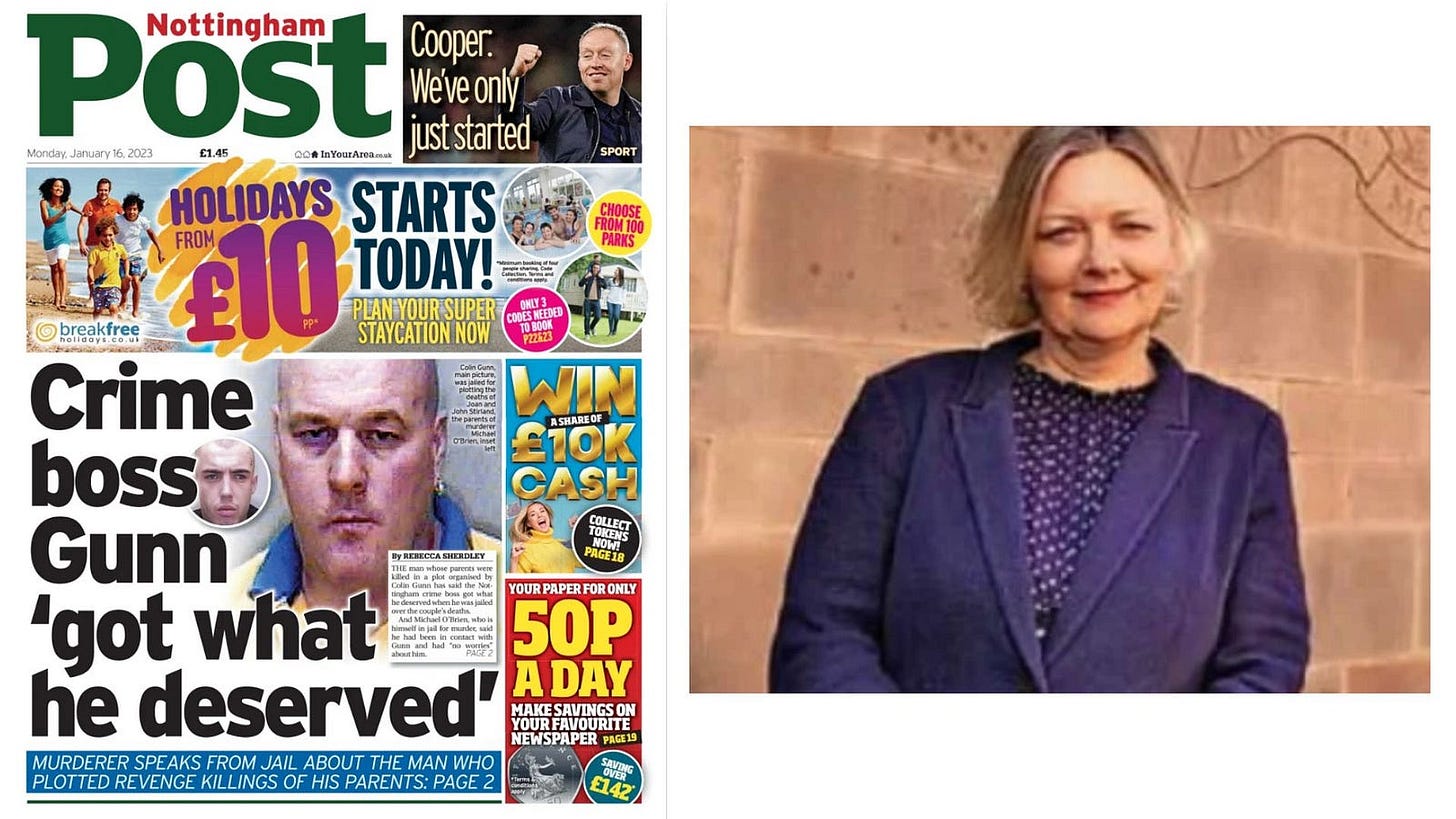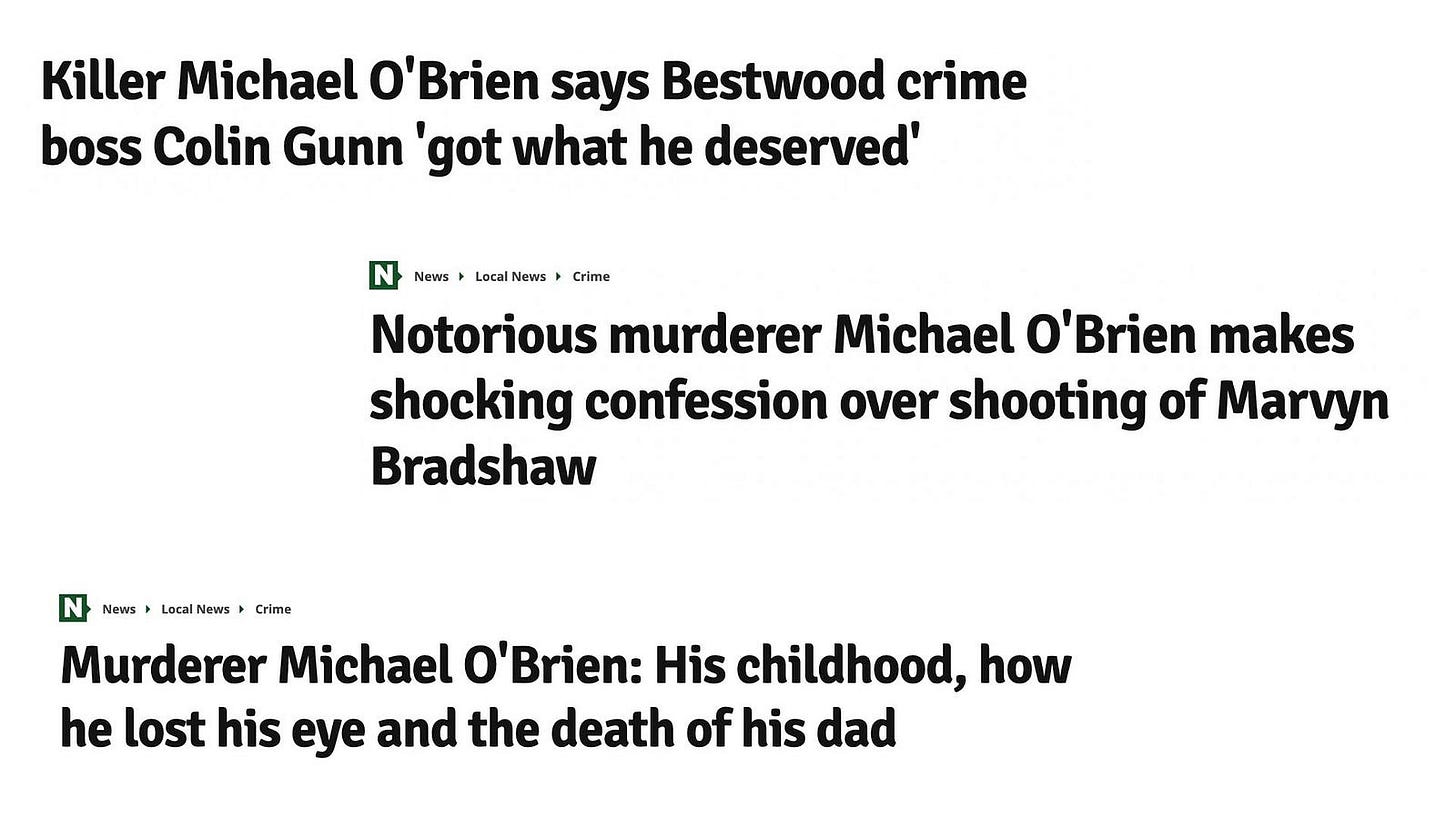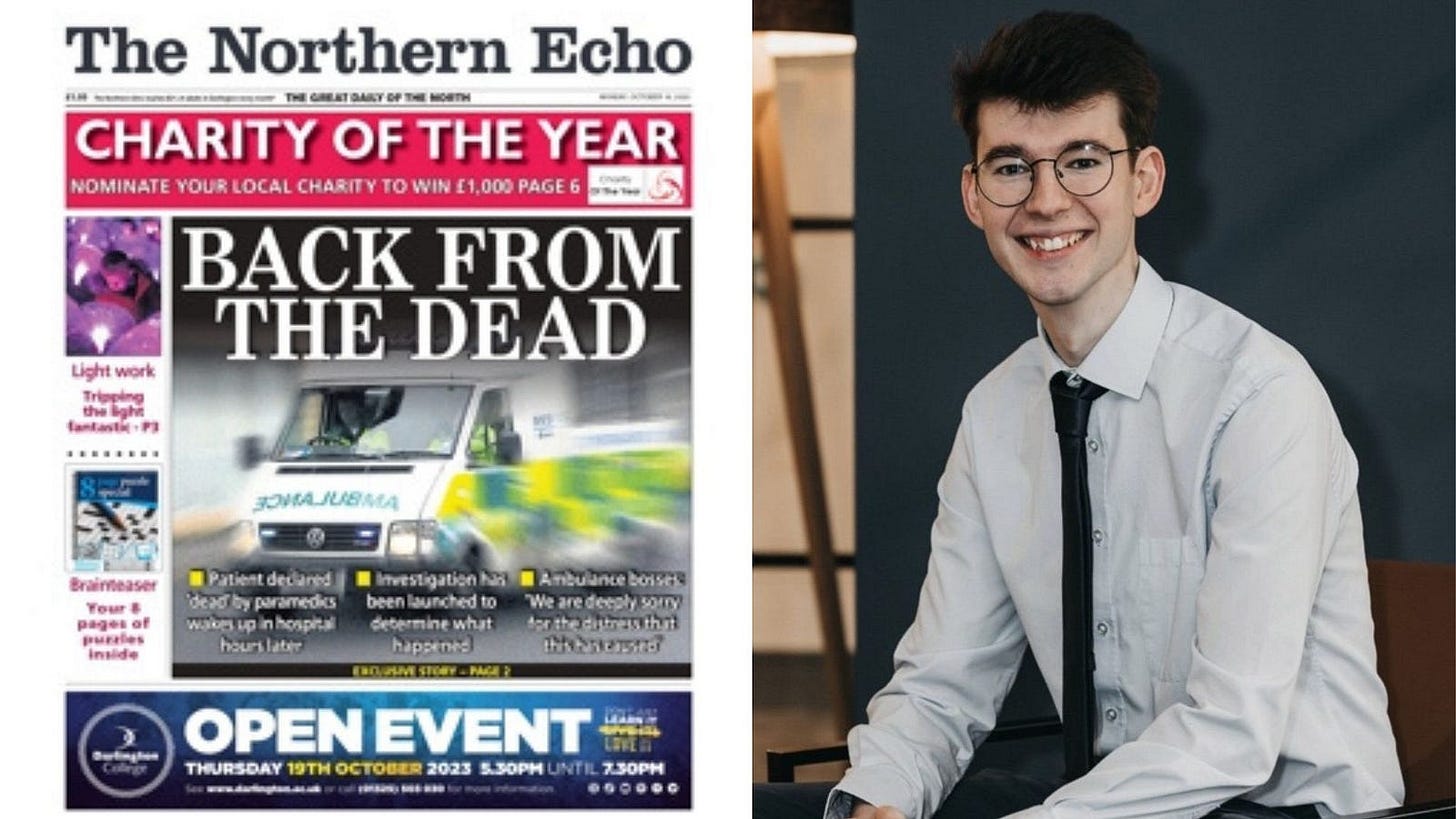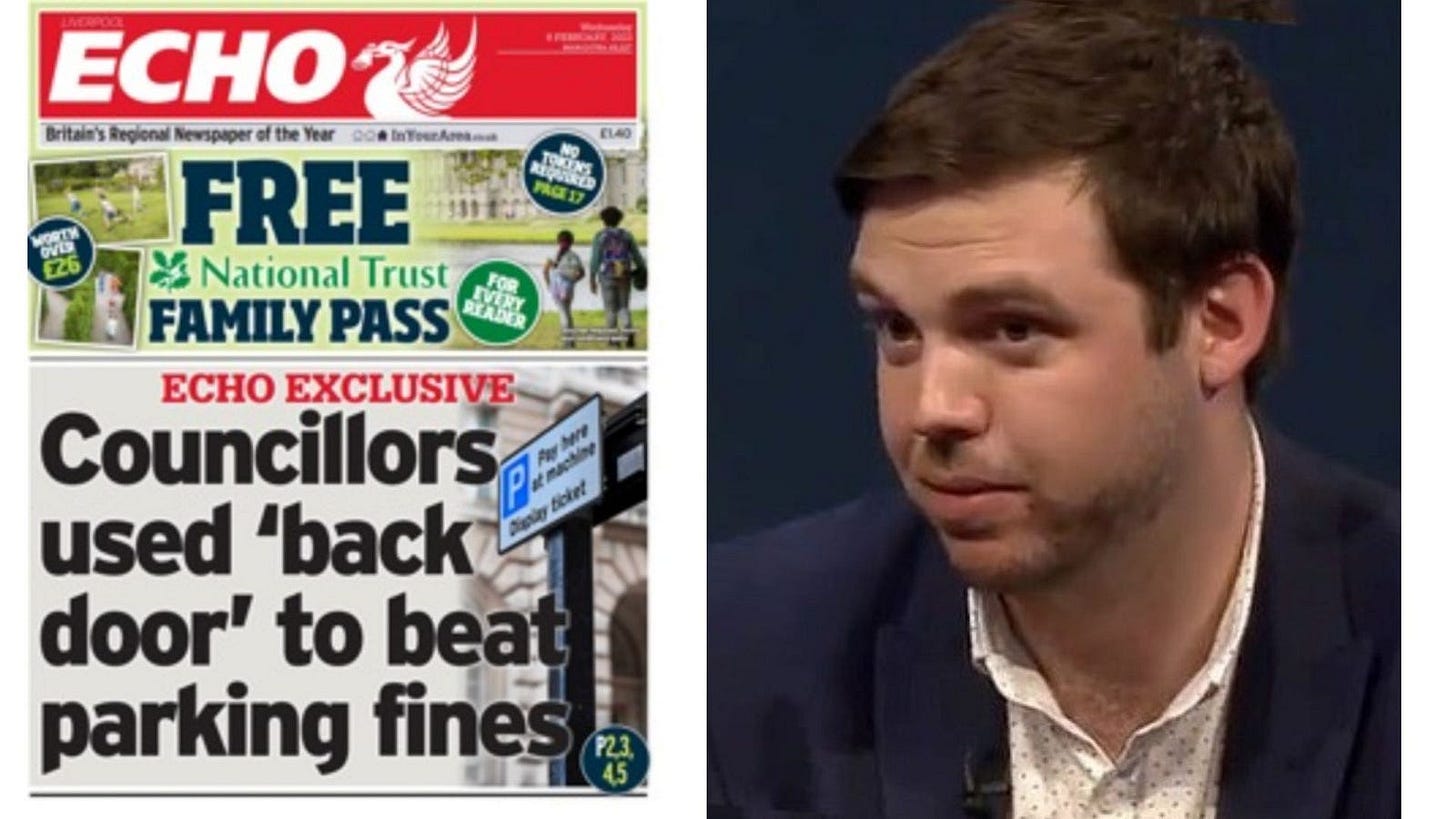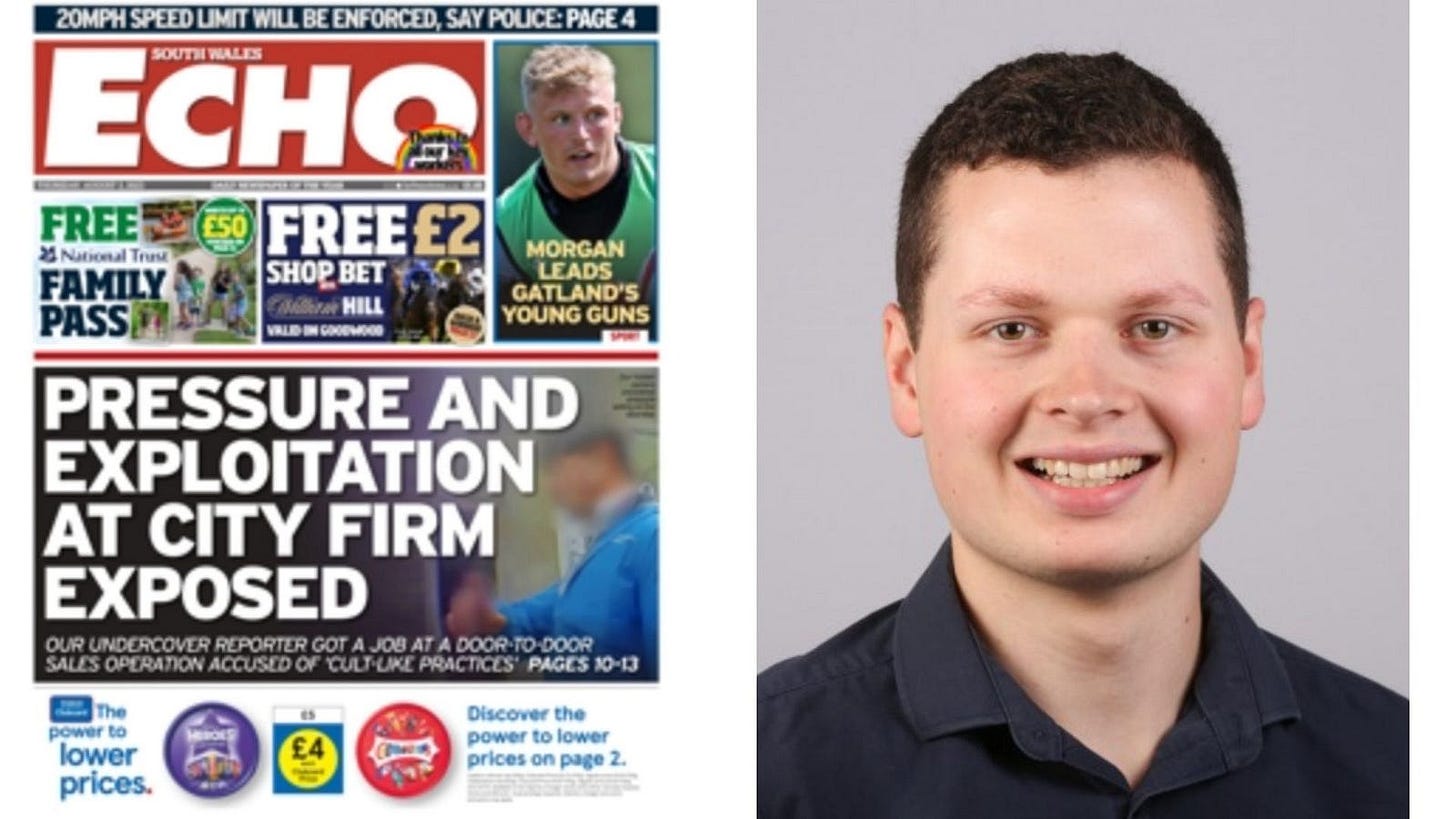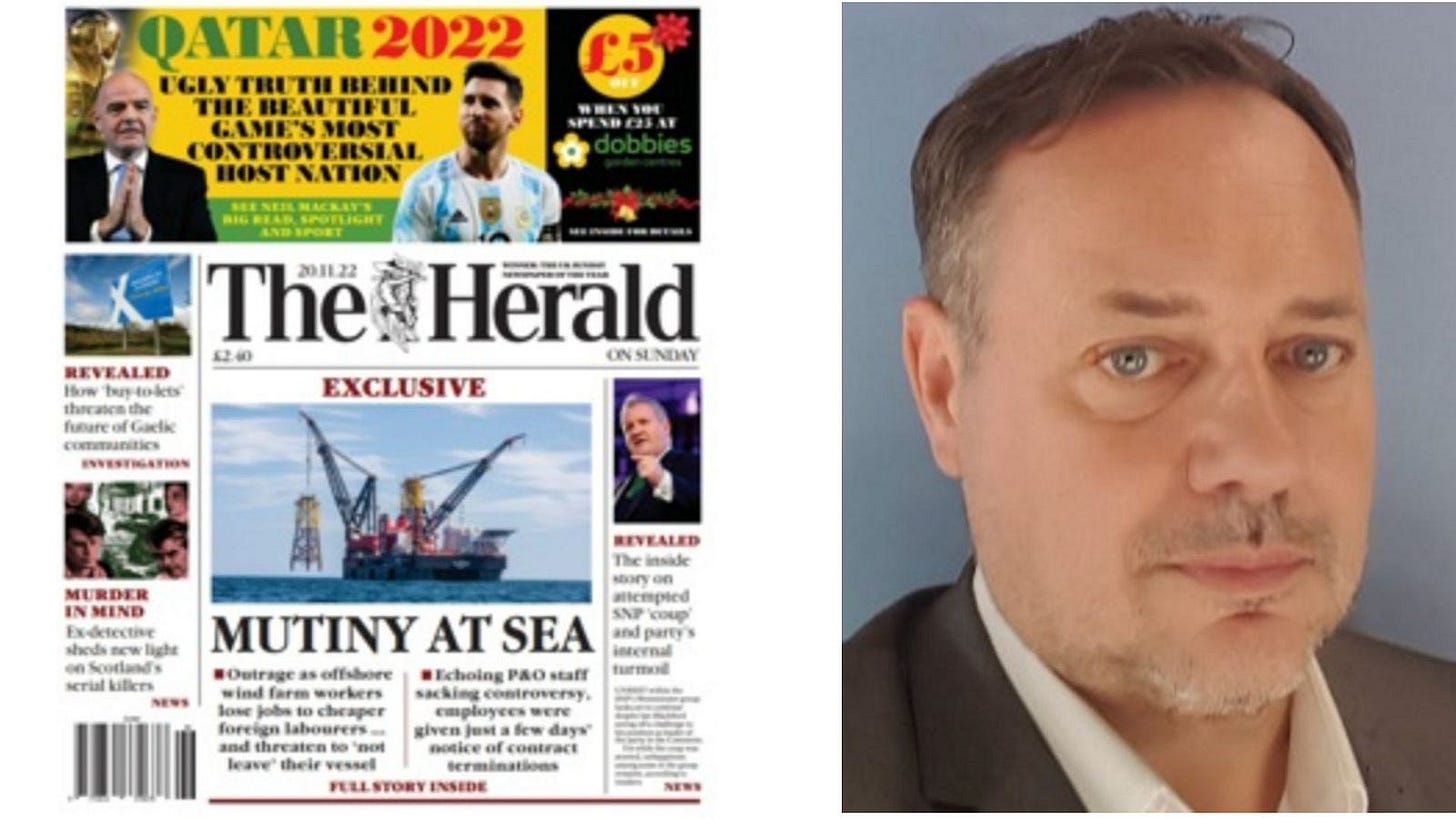The stories behind the local news scoops of the year
Plus: The BBC opens up a new front against rivals, the publisher focusing on a 'forgotten' generation, and the weekly which remembered the victim, not the serial killer, with a special front page
Hello,
We hope this email finds you in a good mood on Easter Bank Holiday Monday. If not, hopefully our long read below will lift your spirits - looking at the entries for scoop of the year at the Regional Press Awards. Seven amazing entries, all very different, and all inspiring for anyone who loves local news.
We’ve got our usual round-up of new jobs in local news, a look at the articles published on Behind Local News over the past seven days, and our list of people, newsrooms and brands which have reason to celebrate at the moment.
Next week's newsletter will include a new weekly feature - Writer's Block. We want to showcase the creative stuff journalists get up to away from the day job. That could be being an author, running a YouTube channel or doing something completely unrelated to local journalism - running a marathon for charity, or playing in a band for example. If you’ve got ideas which could help here, please let us know (email us button just below!)
As ever, please get in touch if you have any feedback - you can do that here - and please also send your news, celebrations and jobs too.
Have a great week,
Behind Local News
New this week
BBC sets sights on winning readers to long form and local investigative journalism
The BBC has announced plans to launch two new brands — prompting claims it is now trying to compete with subscriber-based news services.
Just days after the News Media Association warned the BBC was in danger of leaving the UK with just one news provider — the Beeb — the corporation began outlining plans to further compete with existing publishers.
Titles launch ‘Project Peter Pan’ to give voice to lost housing generation
17 news titles around the UK to provide a voice for a ‘lost generation’ who can’t get on to the housing ladder in the run up to the general election
National World’s titles in its cities division are backing Project Peter Pan, which, according to a launch article, aims to use ‘our collective media power to give a voice to those in their 20s and 30s who have negotiated a pandemic, work hard and are ambitious, yet are lost.’
Remembering the victim, not the killer: Weekly’s special front marks tragic events of 1978
A London weekly cleared its front page to mark what would have been the 60th birthday of a schoolboy who went missing in 1978.
Northern Echo relaunches famous rail campaign as job losses feared
A regional daily has dusted down a previously-won campaign after it emerged a major employer was in danger.
Undercover investigation leads to charity fundraising rule changes
Charities in Wales have been ordered to change how they fundraise following an investigation by WalesOnline.
Celebrating this week
A lot to celebrate in Northern Ireland this week, starting with a new editor at BelfastLive. Sheena McStravick has been confirmed in post after a period as acting editor - congratulations!
Northern Ireland newspapers had a great night at the 2024 Newspaper Awards held in London last week. The Irish News won regional newspaper of the year, the Impartial Reporter was named weekly of the year, and the Belfast Telegraph picked up supplement/magazine of the year.
At the same awards, the Peckham Peculiar, a bi-monthly newspaper in London, was named hyperlocal newspaper of the year - for a second year running.
A remarkable win for Jon Colman, sports reporter at the Carlisle News and Star, who was named regional sports journalist of the year at the Sports Journalist Association Awards for a ninth time!
Congratulations also this week to Josh Williams, a former Reach sports journalist who has turned his passion for data journalism into a popular sports newsletter on Substack - and also published his first book, Data Game.
We mentioned last week a tweet (what else should we call them?) teasing the launch of a new newspaper from newsletter publisher The Lead. More details from editor Ed Walker this week, including plans for two papers a year in 10 towns and cities across the North where The Lead has launched newsletters.
And finally, the Mill Media Co, which publishes newsletters such as the Manchester Mill, hit a major milestone this week - 100,000 subscribers, of which 7,000 are paying.
New jobs this week
Each week, we’ll share some of the latest jobs in local news which have been sent to us. If you have one to promote, please contact us here
The stories behind local journalism’s best scoops of the year

The annual celebration of local and regional journalism, the Regional Press Awards, takes place in April in London. One of the most eagerly awaited categories is always the Scoop of the Year. Today, Behind Local News takes a look at the shortlisted entries, using the words of those behind the magnificent seven entries. From securing murder confessions to uncovering council wrongdoing, the magnificent seven demonstrate the power and importance of local journalism in the UK. Tickets for the awards, taking place on April 16, can be found here.
(You can click here to read the article in full here if your email provider clips email length)
The journalism breakthrough which will prove a massive miscarriage of justice?
Charles Thomson is no stranger to awards ceremonies celebrating the best of local journalism. Best known for his work uncovering a paedophile ring cover up in Shoebury, he made the shortlist for this year’s Regional Press Awards for his work on the Free Jason Moore campaign, to free a man serving life in prison for murder in the East End of London:

I was approached by the campaigners in November 2021. What piqued my interest was that the Free Jason Moore campaign was jointly led by his own family and that of his alleged victim.
The very people you’d expect to be fighting to keep Jason locked up were actually calling for his release, convinced he was innocent of the crime.
Since then, I’ve scoured thousands of pages of interviews, statements, trial transcripts, exhibits. Jason was charged on the basis of a single eyewitness identifying him as the killer.
No forensic evidence linked him to the crime. I re-interviewed witnesses and consulted experts. It became clear that the ID procedure which resulted in Jason’s murder charge was deeply flawed.
The witness was inconsistent, had previously identified someone else as the killer and only picked Jason out having already been shown his photograph.
Experts I interviewed suggested other factors in Jason’s case were a recipe for bad eyewitness evidence.
As so much of what undermined Jason’s conviction hinged on the star witness’s credibility (or lack thereof), I had to find him and see if he would speak to me. I studied his every interview and statement, plus his trial testimony, so I’d arrive knowing the subject inside-out.
My hope was that he would sit down with me and let me slowly take him through his various accounts, showing him how some of what he thought he remembered was disproved by evidence, like CCTV, and how the two men he had identified years apart as the killer bore no resemblance to one another. Maybe he’d agree that he shouldn’t have been relied upon. Maybe he’d persuade me he was right after all. Most likely, I thought, he’d just slam the door in my face.
What I certainly never imagined was that he would start yelling at me that he had been “drunk” on the day in question, so how was he supposed to remember anything? I was so stunned, I pretended I hadn’t heard him properly and asked him to repeat himself. He said it again: he’d been drinking when he witnessed the fatal clash. Moreover, he insisted he had told this to the police. If true, there had been a catastrophic disclosure breach somewhere in the chain. No such information had ever been shared with the defence.
Three days after I published this story, protestors gathered outside the Royal Courts of Justice, demanding Jason Moore’s murder sentence be quashed in light of the new evidence I had uncovered.
The story was picked up by national titles like the Mirror, the Daily Mail, the Guardian and Private Eye. MPs and celebrities backed the Free Jason Moore campaign. The Bishop of Stepney protested outside Downing Street. My story is now at the heart of a new application to the Criminal Cases Review Commission (CCRC) to send Jason’s case back to the Court of Appeal.
The 40-minute interview which secured a confession and solved a 19 year old crime
Rebecca Sherdley’s final year as the Nottingham Post/NottinghamshireLive Legal Affairs Correspondent brought with it the scoop of her career to date — all thanks to asking the right questions, even when you expect the answer to be ‘no’…
I was the Legal Affairs Correspondent for the Nottingham Post/Nottinghamshire Live for 22 years. When I arrived in the city, gun crime levels reached alarming proportions among the criminal fraternity.
Whilst some of these shootings were isolated, others were intrinsically linked to the death of innocent shopfitter Marvyn Bradshaw in a pub car park in August 2003.
Marvyn was driving his Renault when he was shot at close-range by local criminal Michael O’Brien, who was angry he had been turned away from a lock-in at the Sporting Chance bar.
Marvyn’s passenger was Jamie Gunn, the nephew of crime lord Colin Gunn. One year after Marvyn died, Jamie passed away from pneumonia.
The notorious Gunn family blamed O’Brien for causing the demise of Jamie. And, whilst O’Brien was convicted of murdering Marvyn at Nottingham Crown Court, Colin Gunn and his cartel exacted their revenge, tracking down O’Brien’s mum Joan and step-dad John to the Lincolnshire coast.
Two hitmen shot the couple dead. Colin Gunn and two others were convicted of conspiracy to murder the Stirlands at Birmingham Crown Court.
I covered each and every one of the trials; from O’Brien, a later trial of his co-accused Gary Salmon, and the conspiracy trial of Gunn, and Gunn’s trial for his role in police corruption.
In January 2023 I learned that O’Brien was due out on parole and saw a YouTube video of an interview between him from prison with reformed criminal Marvin Herbert. I asked Herbert if I could speak with O’Brien.
The plan was to interview Herbert (who has been investigated for over 24 murders and eight shootings) about his work with ex-offenders.
Out-of-the-blue Herbert called and after a couple of minutes asked me if I’d like to speak with Jay Jay (O’Brien’s nickname). Of course I did, and I had to think on the spot, because I had so many questions on the history of the case.
This was the man who started one of the most incredible, shocking chain of events in British criminal history. O’Brien spoke freely, although I was aware the conversation could end at any time.
But, over 40 minutes, without any pressure, he confessed to killing Marvyn Bradshaw 19 years earlier. That phone call led to a series of features: Notorious murderer Michael O’Brien makes shocking confession over shooting of Marvyn Bradshaw, Murderer Michael O’Brien: His childhood, how he lost his eye and the death of his dad, Killer Michael O’Brien says Bestwood crime boss Colin Gunn ‘got what he deserved’.
Sometimes a reporter gets the scoop of a lifetime — this happened to me — so it’s always worth taking that chance on an interview you think there’s the least likelihood you will get.
The impact of these stories was phenomenal in terms of responses from the wider public and it was a story which needed to be told to the Nottinghamshire public who followed this gripping and sorry tale from the start.
The story of his confession generated more than 25,000 page views.
The woman declared dead by paramedics — only to be alive when she arrived at hospital
It’s a headline many can only dream of uncovering — but for Northern Echo trainee reporter Tom Burgess, it also pointed to much deeper problems at the the local ambulance service, as the Echo’s submission for scoop of the year reveals:
It began with a piece of old-fashioned journalism. A trainee reporter making contacts in their patch following a series of articles on a subject which leads to an explosive tip off.
Over the last 12 months the Echo has highlighted some serious issues with the North East Ambulance Service (NEAS). Serious breaches of rules and regulations, criticisms and whistleblowers lifting the lid on serious issues involving patients not receiving the treatment or care they needed.
Shining a light on a catalogue of blunders and ‘cover ups’ led to court cases, paramedics being struck off, inquiry and service chiefs apologising and pledging change.
But issues have continued and after starting his career at the Echo in July, Tom Burgess has picked up the baton with this story — delving into new issues. Despite his inexperience, he has managed to gain the trust of a number of contacts — with one revealed what was a staggering piece of information involved a team of paramedics who had responded to a 999 incident and declared a woman had died from injuries.
But shockingly when the woman’s ‘body’ was taken to the hospital she was found to be alive.
The blunder was eventually acknowledged by bosses after continuous probing from Tom and we were able to exclusively real this remarkable story.
The story was subsequently followed up by national newspapers, TV and Radio — including BBC, Sky and ITV news who all sent crews to cover the story.
Tom Burgess was asked to appear on Radio 4 to explain how he came to the story and his subsequent discovery. Continuing to pursue lines of inquiry — Tom also found the woman had subsequently died. Service bosses apologised to the woman’s family for the serious error — there is a now an inquiry as to how it happened.
Police have also been brought in to investigate the incident. There is absolutely no doubt this would not have been brought to light without the Northern Echo and the determination and journalistic tenacity of Tom Burgess.
This is an example of regional newspapers at their best. Uncovering an issue affecting one reader which then subsequently becomes national and international news which would never have come to the forefront without a regional newspaper shining a light — that paper being The Northern Echo.
“Even with Northern Ireland’s history of violence this was a shocking development from different sides of the religious divide”
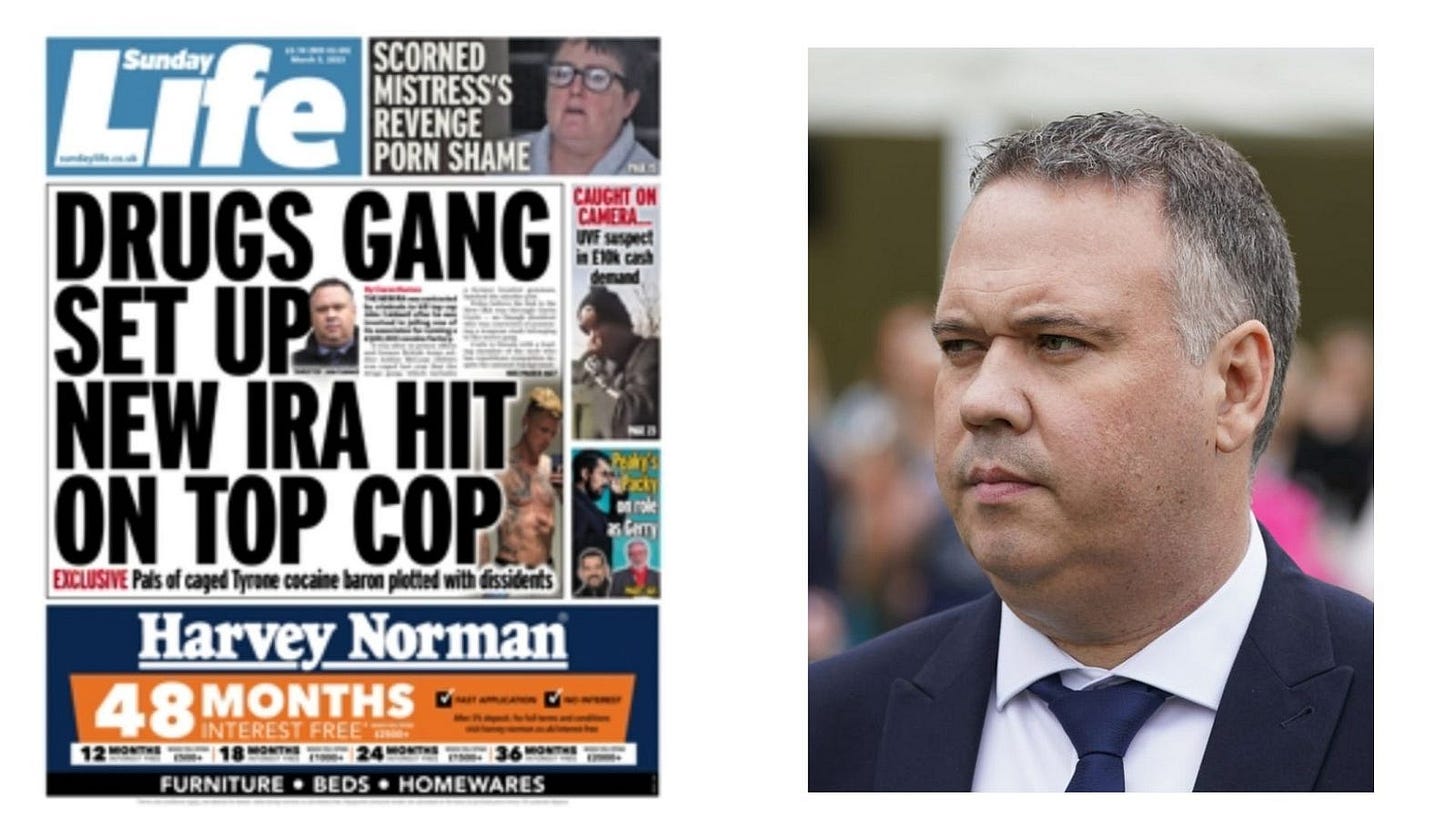
In Northern Ireland, the attempted murder of a senior police officer made headlines for weeks. Within days, sources were briefing Sunday Life journalists — unconvering a chilling plot involving multiple people:
The most high-profile terrorist attack in the UK in 2023 was the attempted murder of Detective Chief Inspector John Caldwell in Omagh, Co Tyrone.
Despite being shot multiple times by two gunmen at a sports centre where he was coaching children, he survived. The attack was claimed by the dissident republican New IRA group which is opposed to Northern Ireland’s peace process. It is the same organisation which murdered journalist Lyra McKee in Derry in 2019.
The attempted murder of DCI Caldwell was widely condemned across the political spectrum, including by Prime Minister Rishi Sunak who later visited the senior police officer in hospital.
Within days of the attack our sources were briefing us on the background. We first named the senior dissident republicans being blamed for organising the shooting and the following week our scoop revealed an alliance which was a first for terrorism in Northern Ireland, a region well used to paramilitary violence over 50 years.
Our March 5 edition revealed how a crime gang with a Protestant/loyalist background joined forces with the republican New IRA to try to kill DCI Caldwell, one of Northern Ireland’s top detectives who had solved many murder, terrorism and crime cases.
Even with Northern Ireland’s history of violence this was a shocking development from different sides of the religious divide. The New IRA was initially formed by previous members of the mainstream IRA after they declared a ceasefire and, like all IRA breakaway groups, exclusively recruited members from the Catholic/nationalist/republican community.
One of the crime gang suspects, who has since been charged in the non-jury case, was also a former gunman for the UVF, a loyalist terror group which has killed hundreds of Catholics and republicans.
The opposing factions were united in hate for a police officer who helped bring many of their associates to justice. Since we broke this story seven people have been charged with the murder bid, four of whom are Protestants, including the two brothers and father of the ex-soldier and convicted drugs baron we named, Ashley McLean.
The case outlined so far has completely confirmed our scoop.
People across Northern Ireland and beyond are fascinated by this case and the alliances exposed by it. It was one of our most subscribed stories of the year and most read.
Since we published the story DCI John Caldwell has spoken publicly for the first time about the attack when we presented him with an award at our annual Spirit of Northern Ireland Awards event.
The Prime Minister announced him as winner and our words, pictures and video on his and DCI Caldwell’s speeches was widely used by other media afterwards.
16 months from tip-off to splash — and the ramifications for local councillors were huge
It was a tip-off which took 16 months to stand up — but it was worth the wait for Liverpool Echo political editor Liam Thorp, who used every route available to him to find out if councillors really were getting parking tickets written off just for being councillors. They were, and the story made waves quickly…
It was the scoop and the scandal that sent shockwaves through a city and beyond.
In February 2023 the Liverpool Echo published a 16-month investigation by Political Editor Liam Thorp into a back door parking fines scheme at Liverpool City Council and named 14 current and former elected councillors as having been involved.
Liam had first been made aware through his sources back in October 2021 of rumours of a scheme in which elected councillors who had received a parking fine had seen their tickets thrown out by senior council officers without going through and of the official channels that ordinary members of the public would have to go through.
With the backing of his editors, he set about investigating the rumours. It would take 16 months of hard work, Freedom of Information battles and outright belligerence to get to the truth of the matter.
The success of the investigation meant that the ECHO was able to publish the names of the 14 politicians involved, including one former deputy mayor who had seen 17 tickets written off by officers through this backdoor methods.
The story received a huge response and plenty of national coverage. Liam was asked to write an editorial on his investigation for The Times and his work was nominated for the prestigious Private Eye Paul Foot Awards in 2023.
More importantly, the investigation had major impacts in terms of the councillors who were implicated. One senior Labour councillor quit the council as a direct result of the investigation, while another was blocked from standing for election again.
Two others who were named have also left the council.
There is no more important role for journalism than in holding those in power to account and this tireless, explosive investigation and the subsequent ramifications proved how vital the regional press is in carrying out that vital duty.
The hidden camera investigation which uncovered exploitation and pressure-selling on behalf of charities
Old and new journalism techniques combined when WalesOnline’s investigations editor Conor Gogarty exposed a darker side to charity fundraising in Wales:
This is a series of alarming stories which have brought awareness and scrutiny of a direct sales industry rife with exploitation. WalesOnline investigations editor Conor Gogarty’s work has caused a cult-like sales office to close, made many national headlines and led regulators to launch investigations.
The first spark for Conor going undercover as a door-to-door sales rep came when he was browsing social media, where people had posted about bad experiences working for a sales company in Cardiff.
After arranging interviews with those people, Conor wrote a story that uncovered gruelling work conditions. That initial piece was read by some 76,665 people and picked up by several national titles.
But the main scoop we want to highlight is a follow-up which saw Conor go undercover at the same Cardiff sales office.
Wearing a hidden camera, he exposed extremely misleading job adverts, lies told on doorsteps to sign elderly people up to charity payments, and appalling treatment of young sales reps.
After three days working at the business, including a 12-hour shift, Conor’s earnings were just £35. He then contacted an employment lawyer, who explained how Conor’s evidence undermined the self-employment loophole that the firm had used to justify not paying minimum wage.
Across the months of work behind this series of stories, Conor spoke to dozens of sources, some giving in-depth interviews, others providing important background knowledge that helped Conor go undercover.
The reporting gave a voice to young people who shared disturbing experiences of what they had been manipulated into believing would bring them riches.
After confronting the operation’s managing director on camera, Conor’s reporting had a significant real-world impact.
It led to the office shutting, revealed exploitation at linked sales offices, and sparked a Fundraising Regulator investigation which is set to conclude in the coming months. One of the charities involved reported a ‘serious incident’ to the Charity Commission over our findings, prompting a separate regulatory investigation.
The article, which made headlines across national titles, has been read 71,440 times on the WalesOnline website, while the accompanying 18-minute documentary was watched 7,000 times on Youtube and 1.6 million times on TikTok.
There was an overwhelming reaction from readers and viewers praising the huge amount of work that had gone into our journalism.
The investigation also shone a light on concerns over a wider direct sales network and, as will be covered in a soon-to-be-published follow-up, has prompted the closure of a second Cardiff sales office. Conor is determined to continue holding to account a dehumanising direct sales industry and a system which has enabled it.
Companies exposed for importing foreign labourers to sack more expensive British crews
For the Herald’s Martin Williams, exhaustive investigations were required to uncover what was going on off the coast of Scotland — a situation so dire it had led to plans for a mutiny:
This was an investigation into how British workers were being replaced by cheap foreign labour to serve Scotland’s green revolution after the Home Office agreed to extend a migrant worker extension and it has led to plans for a mutiny on one offshore wind project.
We used first-hand accounts, an interview with one executive and an employment agency manager and used leaked documentary evidence to show how Scots were being laid off in favour of foreign nationals — citing two different incidents.
We discovered how one British-based crew had been let go on the day they were due to start work on one of Scotland’s largest offshore wind farms — with recruiters citing the extension of the Offshore Wind Workers Concession (OWWC) rules which allows the employment of cheaper foreign nationals on offshore wind projects.
We revealed the extent of the fight against the OWWC which allows companies to skip the usual post-Brexit immigration restrictions and employ foreign nationals to join vessels engaged in the construction and maintenance of offshore wind farms.
Originally introduced in 2017, we revealed how the government has repeatedly renewed the ‘temporary’ concession and done at the time of the article, extending it until April 30, 2023.
We heard from union sources that stated that a British deck hand would be paid £18 to £20 an hour and were to be replaced by cheaper Asian workers. They say it is the first blatant signs of the extensive use of the preference for cheap foreign workers off Scotlands shores that has been widely rumoured.
One offshore service and supply ship shipping company told us that their crew salaries were in line with at least the national minimum wage which is at £9.50 an hour. We saw papers from staff that showed how the workers on the vessel were given their marching orders by recruiters on the very day their contract was due to start and they were due to join the vessel.
They were to be replaced by a Filipino crew that had previously worked on it. In another incident on another vessel British workers were told that they were being let go with mainly Malaysian workers replacing them.
It resulted in political pressure on the UK Government closure of the loophole — and the issue was raised in Parliament. As of earlier this year we discovered that the loophole was closed.
Thanks for reading - if you’re not already signed up to the newsletter you can do so here:
Or if you are and you want to share today’s newsletter, you can do so here:




